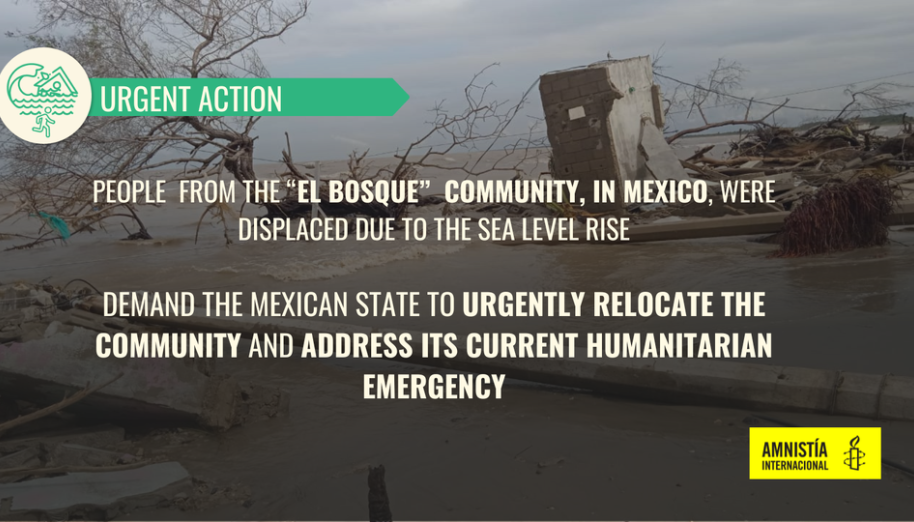Eighty-four people from the “El Bosque” community, in southern Mexico, were evacuated to Frontera village (12 km far from El Bosque) on November 1, 2023. The evacuation was due to rising sea levels and the devastating effects of the climate crisis. Mexican authorities promised to relocate the community in April 2023 in the face of the terrible impacts of sea level rise, that has threatened the community since 2019. Despite the continued destruction of homes and critical infrastructure, the relocation has not yet materialized. The Mexican State must guarantee the human rights of the people from El Bosque in the face of the current humanitarian emergency, and immediately provide participatory and just relocation.
Here’s what you can do:
Write to the Mexican President urging him to:
- Ensure that his government expedites the relocation process of El Bosque, ensuring it is participatory and just, always guaranteeing the human rights of the affected people.
- Take measures to prevent, reduce and mitigate the risks, losses and damages caused by climate change, like robust mitigation and adaptation measures based on human rights.
Write to:
Andrés Manuel López Obrador
President of México
Plaza De La Constitución S/N Palacio Nacional,
Centro, Cuauhtémoc, Ciudad de México,
C.P. 06067, México
Email: atencionciudadana@segob.gob.mx alejandro.esquer@presidencia.gob.mx
Tw: @lopezobrador
Salutation: Your Excellency:
And copy:
His Excellency Carlos Manuel JOAQUIN GONZALEZ
Ambassador
Embassy of the United Mexican States
45 O’Connor Street, Suites 1000 and 1030
Ottawa, ON K1P 1A4
Tel: (613) 233-8988, -9272, -9917 / 613-795-1868 (24h) Fax: (613) 235-9123
Email: infocan@sre.gob.mx
Background
El Bosque is a fishing community in the state of Tabasco, southern Mexico, affected by rising sea levels and coastal erosion intensified by the climate crisis. Since 2019, due to constant tidal waves and extreme weather events, the coastline of El Bosque has lost 200 meters (about 656.17 ft), resulting in the destruction of homes and community infrastructure.
In April 2023, El Bosque community started negotiations with the Ministry of Agrarian, Territorial and Urban Development (Secretaría de Desarrollo Agrario, Territorial y Urbano) of Mexico and the Mexican National Housing Commission (Comisión Nacional de Vivienda en México) to be relocated. However, this process has not progressed, leaving the community vulnerable to new extreme weather events, such as the torrential rains of Cold Front 8 on November 1.
Amnesty International has received information and, about the humanitarian crisis faced by nearly 64 families of El Bosque. Prior to the events of November 1, the community had already lost more than 50 houses to rising sea levels, forcing people to live in temporary shelters in the community or to be displaced.
Also, before November 1, the community reported that the water wells of El Bosque were already infiltrated by seawater, the healthcare services were neither constant nor adequate; electricity service was intermittent; and due to the destruction of their schools, children were forced to attend classes in an inadequate infrastructure to guarantee their right to education. Following the events of November 1, the community’s situation has only worsened.
Climate emergency
Under international human rights law, the Mexican State must adopt measures to protect, prevent and reduce the risks, losses and damages caused by the foreseeable and unforeseeable consequences of climate change. The development of robust mitigation and adaptation measures could reduce the number of people forced to move due to the consequences of climate change and prevent the aggravation of losses and damages generated by the climate emergency.
Unfortunately, the Mexican government has chosen to continue increasing oil production, instead of generating solid commitments for a just energy transition to comply with the commitments made in the Paris Agreement. The situation in El Bosque, and in Acapulco, (city that on October 25, suffered the impacts of Hurricane Otis, the strongest storm ever to hit Mexico’s Pacific coast), show the failure of the Mexican government to protect the most marginalized groups that bear the brunt of the climate crisis.
The Mexican State also has a duty to ensure that planned permanent relocations are a measure of last resort, and in cases such as El Bosque in Tabasco, where such internal displacement is imminent, it must comply with the framework of international obligations on internal displacement, which establish that a durable solution for displaced persons be achieved.
This durable solution must ensure that displaced persons can enjoy, without discrimination, all their human rights, including security; an adequate standard of living, including access to food, water, adequate housing, employment and elementary education; access to work and means of subsistence; and access to effective mechanisms for the restitution of housing, land and property of displaced persons, or to provide them with adequate compensation.













